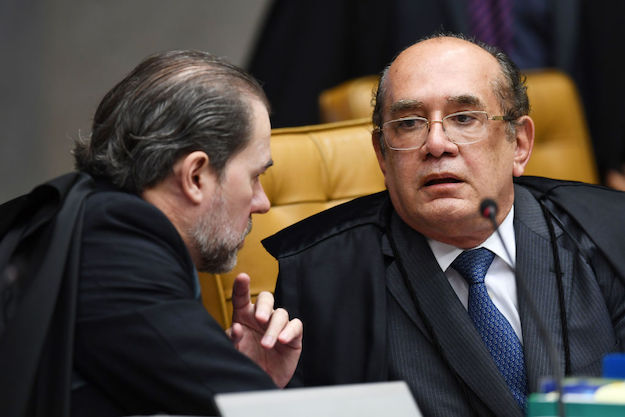BRASÍLIA – Brazil’s judiciary has almost always walked hand-in-hand with its political class. That’s partly why the Lava Jato investigations, in which the Federal Supreme Court (STF) has come into direct conflict with the entire political system, have been so earth-shattering.
With a long list of legislators under investigation for their links to the largest corruption scheme in the country’s history, the STF for a time became the terror of Brazil’s governing elite.
But the winds have changed. As the STF prepares to make a fateful decision over whether to allow prison sentences to begin before a defendant’s appeals process is fully exhausted, the judiciary and the political establishment seem back in lockstep. There is a strong perception in the Court and Congress that Lava Jato prosecutors and judges have gone too far, and that it would be best if the investigations faded, at least a little, into the background.
This week, the Court is expected to reverse recent precedents by ruling that defendants can only be put in jail after they’ve gone through all of the appeals processes available to them. This could have significant implications for at least 15 Lava Jato defendants – including former President Luiz Inácio Lula da Silva, who is currently in jail but would be released on appeal if the Court does indeed reverse itself.
It’s enough to give observers whiplash. It was just over three years ago when the STF adopted the understanding that defendants who have a conviction upheld by a single appellate court may be sent to jail to begin serving their sentences. Based on this principle, a number of Lava Jato defendants, including Lula, were jailed while their sentences were still under appeal.
But Brazil’s Constitution explicitly states that a person can not be considered guilty until due process is fully concluded – and a majority of Supreme Court justices again seems ready to endorse that understanding. If they do, it would be the third time in 10 years that the STF has changed its opinion on the matter.
To fully understand this decision, we must remember what was occurring in Brazil when the STF last adopted stricter rules regarding the imprisonment of defendants. In 2016, then-President Dilma Rousseff had a poor relationship with Congress and her government was hobbled by allegations of corruption at the mostly state-owned oil company Petrobras.
With Rousseff’s impeachment – led by then-Speaker of the House Eduardo Cunha, who is now in jail for crimes connected to Lava Jato – her Workers’ Party (PT) lost its hold on power. At the same time, Lula, the party’s supreme leader, was facing a criminal case for which he would later be convicted. Based on the new STF interpretation, Lula went straight to jail after an appellate court confirmed his conviction.
The Lava Jato investigations, with its high-profile arrests, at the time enjoyed enormous public support and had become a political sensation. The operation even had a symbol: Sérgio Moro, a trial court judge whose name became synonymous with fighting impunity. For the Court, doing everything it could to support the investigations was both popular and politically expedient.
It was fitting that as soon as the STF changed its precedents in 2016, Moro was one of the first public figures to celebrate the decision. “Closing this window of impunity, we can send a more general message that the system is changing, and that impunity will no longer be the rule,” he said in an interview with JOTA.
The 2016 decision happened largely due to a change in opinion from Justice Gilmar Mendes, one of the PT’s biggest critics. He had voted against sending defendants to jail after a single failed appeal in 2009, but changed his mind in 2016.
Jump to 2019, and the circumstances – both political and judicial – have changed.
After being hung out to dry by Lava Jato, the political class reorganized. Everyone now realizes that Lava Jato goes way beyond the PT, implicating all of the major political parties in Brazil (PSDB, DEM and PMDB). An anti-corruption push, it turns out, won’t leave any of them unscathed.
Text messages leaked to The Intercept Brasil, revealing alleged illegal collaboration between Moro and Lava Jato prosecutors, added fuel to the fire. If the investigators were biased, then the tools they used to lock up politicians accused of corruption – like the ability to send defendants to jail before their appeals were up – are no longer needed.
The operation – along with Moro – remains popular with the electorate and the press. However, the unconditional applause of the past has become quieter. Lava Jato is no longer seen as an investigation immune to errors. Politics, put on the back foot by Lava Jato, is standing tall once again. And the Supreme Court, in the country’s new political circumstances, is set to deliver its message: Lava Jato and the fight against corruption can continue, but now under our rules, and not by the terms defined by Moro and the “Força Tarefa.”
—
Seligman is co-founder and COO of JOTA, a Brazilian news site dedicated to judicial analysis. Recondo is a journalist and co-founder of JOTA.







